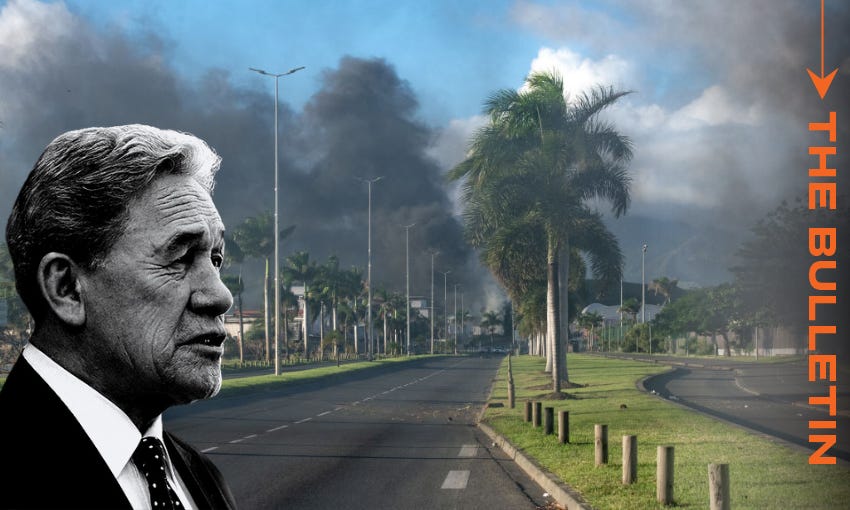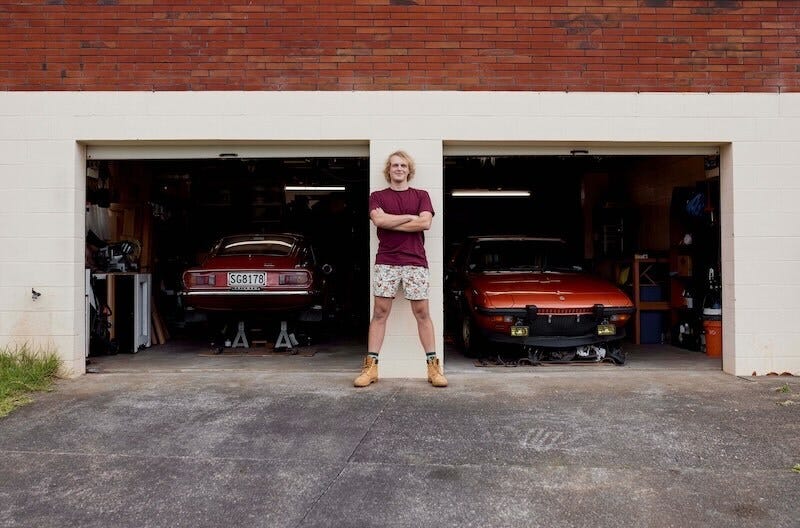What’s happening in New Caledonia and Vanuatu, and why it matters to NZ
Winston Peters has been on tour around the Pacific while two very different crises unfolded.
Mōrena, and welcome to The Bulletin for Friday, May 17, produced in partnership with Blind Low Vision NZ.
In today’s edition: Julie Anne Genter speaks out, should we be worried about TikTok, and why Fonterra’s latest move is a big deal. But first, a look at what’s been going on in the Pacific and the ramifications it has for Aotearoa.
Two separate and very different crises
Deputy prime minister Winston Peters has been on a tour of the Pacific this week – his second in this term of office. He’s been joined by a handful of government ministers and Labour’s foreign affairs spokesperson David Parker. The trip was an opportunity, said Peters at the outset, to strengthen New Zealand’s engagement with the region. But Peters’ time abroad has come against the backdrop of two major stories in the Pacific, both of which impact New Zealand and New Zealanders. So today we’re going to zone in on what’s been happening in New Caledonia and Vanuatu.
A state of emergency in New Caledonia
Catherine McGregor summarised the situation in New Caledonia in this week’s edition of The Spinoff’s World Bulletin, which you can access as a Spinoff member. As of this morning, there have been five people killed, and hundreds injured, in riots triggered by controversial voting reforms. RNZ has a helpful explainer here on what sparked the civil unrest in the French territory, which has effectively closed down the nation’s capital Nouméa. Peters and the delegation were due to visit New Caledonia earlier in the week, but The Post reported that the trip was postponed due to the violence. In a statement yesterday afternoon, Peters urged for “all sides to take steps to de-escalate the situation, so that there can be dialogue and calm”. Peters said the safety of New Zealanders in New Caledonia was of “utmost concern”, and asked those on the island to register via SafeTravel. One New Zealander on the ground in Nouméa described the situation to RNZ’s Morning Report yesterday, saying the town was on fire. A business owner in New Caledonia told the Pacific Media Network that many shops and buildings have been “burned and looted”, while local militia have had to secure housing “because the police have been completely overwhelmed”. On RNZ’s Checkpoint last night, New Caledonian expats here in New Zealand said they were scared for their families back home. One woman, who has been in Aotearoa for two years, said she felt grateful to be safe – “but at the same time I feel so bad for my family and friends over there”.
No way home
Meanwhile, Vanuatu has been facing a crisis of an entirely different nature. The country’s airline, Air Vanuatu, went into liquidation at the end of last week, grounding planes and leaving close to 1,500 regional workers here in New Zealand unable to make it home – as well as hitting the tourism market that bolsters Vanuatu’s economy. Peters visited Vanuatu earlier in the week and raised concerns about the impact of the situation, as Tagata Pasifika reported. “Everybody here is concerned about this really significant utility for this economy and its long-term future,” Peters said. That same report details the potential impact for locals in Vanuatu who rely on tourism to make a living. One local weaver, Regina Toa, said it would prove challenging for her family. For regional workers here in New Zealand, the collapse of the airline has meant getting back home at the end of the summer season is impossible, or at least prohibitively expensive. On Wednesday night, Tahu Huntley, the RSE manager at Nelson-based labour company Hortus, explained to RNZ’s Checkpoint just how complicated it would be to get workers back to Vanuatu. “It ranges anywhere from $1,000 to $1,600 one way to get these guys home,” he said. As of last night, RNZ’s reported there are 1,458 RSE workers stranded in New Zealand with visas soon to expire.
Why the foreign minister was in the region
The New Zealand delegation managed to visit the Solomon Islands, Papua New Guinea and Vanuatu earlier in the week, wrapping its tour in Tuvalu yesterday. While it’s not unusual for a foreign minister to spend much of their time overseas, the coalition government has emphasised the importance of connecting New Zealand with the rest of the world. Prime minister Christopher Luxon told the Herald’s Audrey Young last week, while discussing the controversy over Aukus, that bipartisanship in foreign policy was “important for a small country like New Zealand”. For Peters, he has to balance his role in the coalition government with his position as the country’s most high profile diplomat. And when it comes to something like Aukus, the government’s move towards it may prove unpopular in the Pacific as this piece from PMN in April looks at. As for the current crises, there is no clear end in sight. New Caledonia’s state of emergency is in place for 12 days and France is sending in police and military reinforcements in an attempt to prevent further unrest.
Behind the roller door: what’s happening in the humble New Zealand garage?
As it turns out – way more than just cars. New national research commissioned by AA Insurance looked into how New Zealanders with garages are using them.
What they found was colourful and varied. From textile workshops, to fermentation stations many hobbies and intriguing items are contained within. And when you add family heirloom pianolas in the mix, the contents of the Kiwi garage truly know no bounds.
Enter the garage, here. (sponsored)
Fonterra’s major ‘step-change’
Dairy giant Fonterra is looking to sell its global consumer business, which includes well-known brands like Anchor, Mainland and Kāpiti, reported BusinessDesk. Those brands used about 15% of co-operative’s total milk solids, and in the first half of this year, represented about 19% of its underlying profit. Fonterra called the move a “step change” in its strategic direction, with chief executive Miles Hurrell saying it would mean the co-op could increase its value to farmers as a business-to-business dairy nutrition provider. Writing for Farmer’s Weekly, Hugh Stringleman called the move the “most dramatic major structural change” in Fonterra’s history. “It is effectively an end to international expansion and a circling of the wagons.”
Julie Anne Genter: ‘I crossed a line’
On the front page of the Herald this morning (paywalled), embattled Green MP Julie Anne Genter gives her first substantive interview to Georgina Campbell following claims of intimidation that stemmed from an outburst in parliament. Genter will receive de-escalation training, and hopes this incident won’t become the defining moment of her time as an MP. “I think it’s learning to recognise when you might be having a fight or flight response and making sure that you have the tools necessary to say the right thing or take the right action that is not going to lead to an intense situation escalating. And in fact, calm it down,” Genter said. In his Herald column today (paywalled), Matthew Hooton looks at the string of recent scandals for the Greens and what it could mean for the party.
Listen: Floods knocked out Redclyffe substation, so why rebuild on the same flood-prone site?
Flood damage from Cyclone Gabrielle means Redclyffe substation needs to be rebuilt. Transpower’s Mark Ryall joins Bernard on When the Facts Change to discuss the curious decision to rebuild on the same flood-prone site.
Click and Collect
Paula Penfold at Stuff has a great read looking at how and why a contaminated mattress returned to the company that sold it ended up at an op shop.
What's going on with the 2024 US presidential election? The Spinoff’s Catherine McGregor explains.
Has anyone else been fascinated by the ongoing saga over Francis Ford Coppola’s Megalopolis? I certainly have been. The film has just secured a global Imax deal as it readies to premiere at Cannes.
Tova O’Brien looks at TikTok: Is it safe, should our kids be using it, and is PM Christopher Luxon worried about being on it.
Final call! The Spinoff is looking for a new staff writer – it’s your last chance to apply.
Hera Lindsay Bird ranks New Zealand's fake bacon brands from best to worst. Joel MacManus talks to Tyrone Barugh, the man behind some of New Zealand's weirdest legal cases. Madeleine Chapman talks to Ockham's winner Emily Perkins the morning after her big win. Hera Lindsay Bird revisits 10 moments of national insignificance from the New Zealand Archives. And Hera Lindsay Bird also advises a reader who wants to switch hairdresser but feels soooo guilty in her weekly advice column.
NZ Journo cracks Forbes Under 30 list
To finish the week, something cool. New Zealand journalist Madison Reidy has cracked Forbe’s 30 Under 30 list for Asia. “Wtf is this real?!” she wrote on Twitter. You can listen to Reidy, who hosts the Herald show Markets with Madison, in conversation with The Spinoff’s Duncan Greive on The Fold here. 🙌
That’s the end of another busy week, thanks for reading. I’ll be back on Monday.
Got some feedback about The Bulletin, or anything in the news? Get in touch with me at thebulletin@thespinoff.co.nz.
If you liked what you read today, share The Bulletin with friends, family and colleagues.
















I love the Spinoff but the article and research by AA Insurance on what people use their garages feels tone deaf. What about all the people living in garages.because they have nowhere else to go? This research completely overlooks this. Weird advertisement. Sorry guys.
As always, another great run down. It’s a shame, though, there was no mention of Pink Shirt Day and the massive problems we have with bullying in our schools and businesses in Aotearoa…